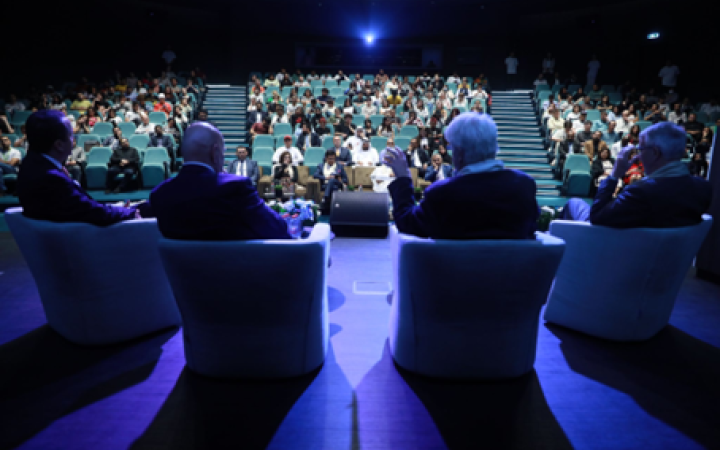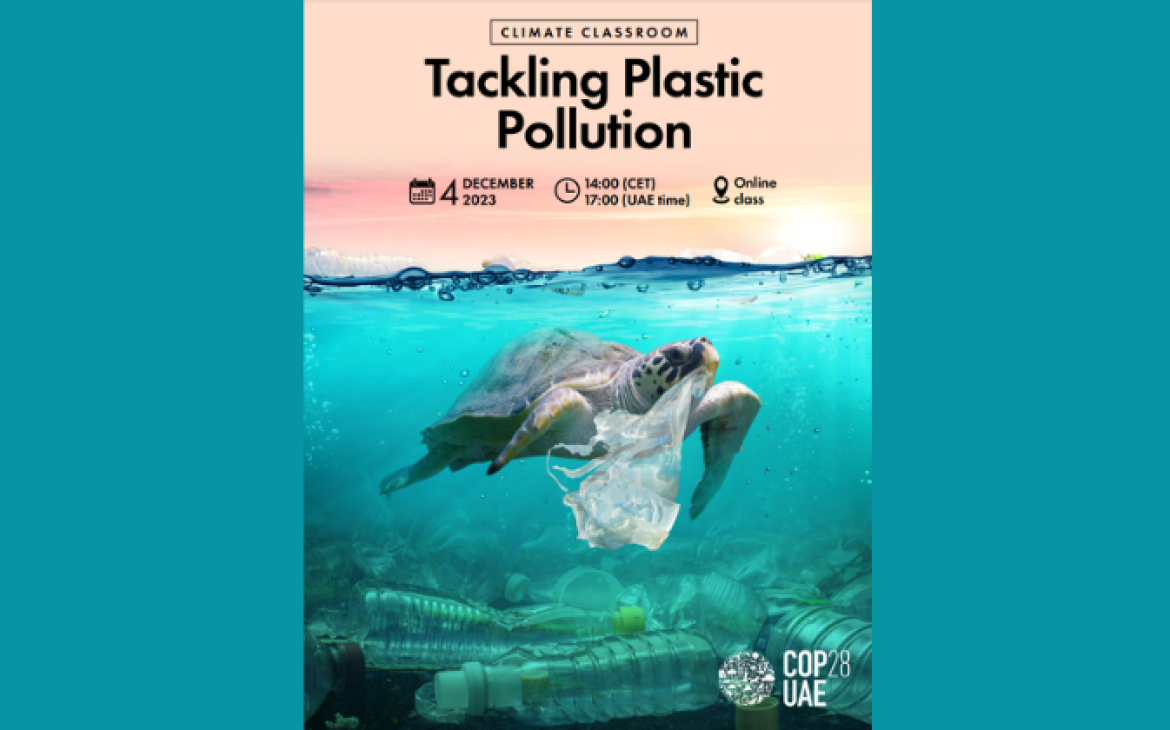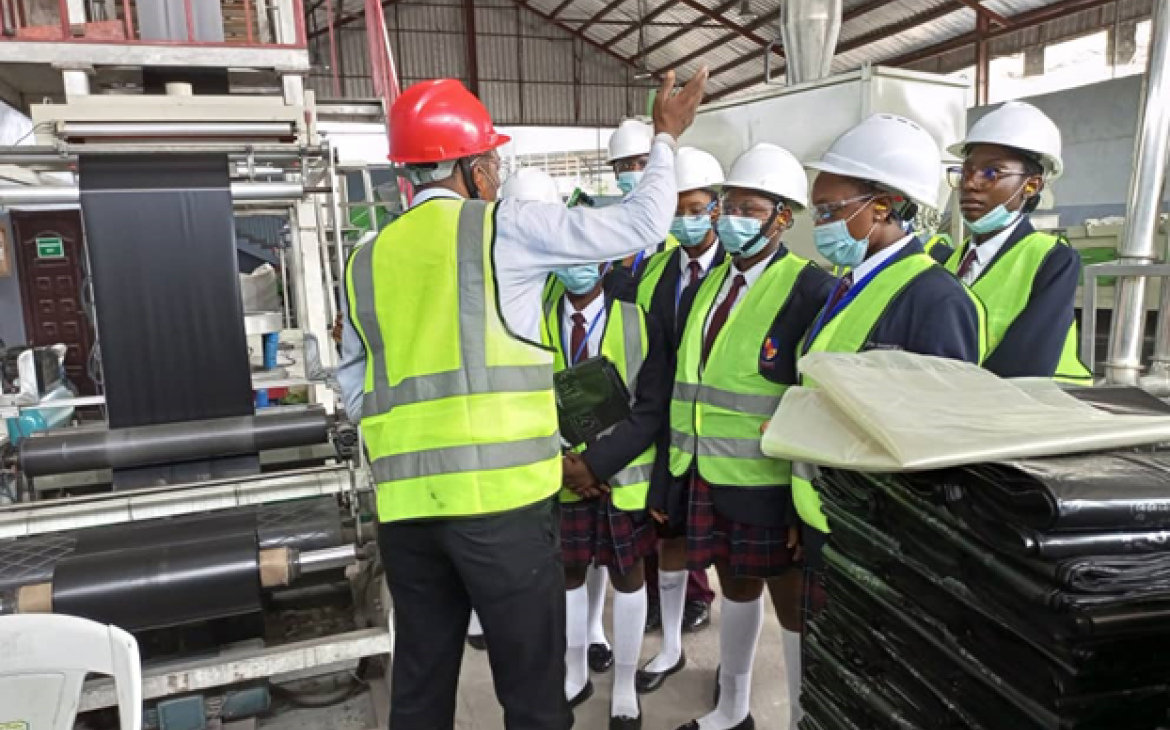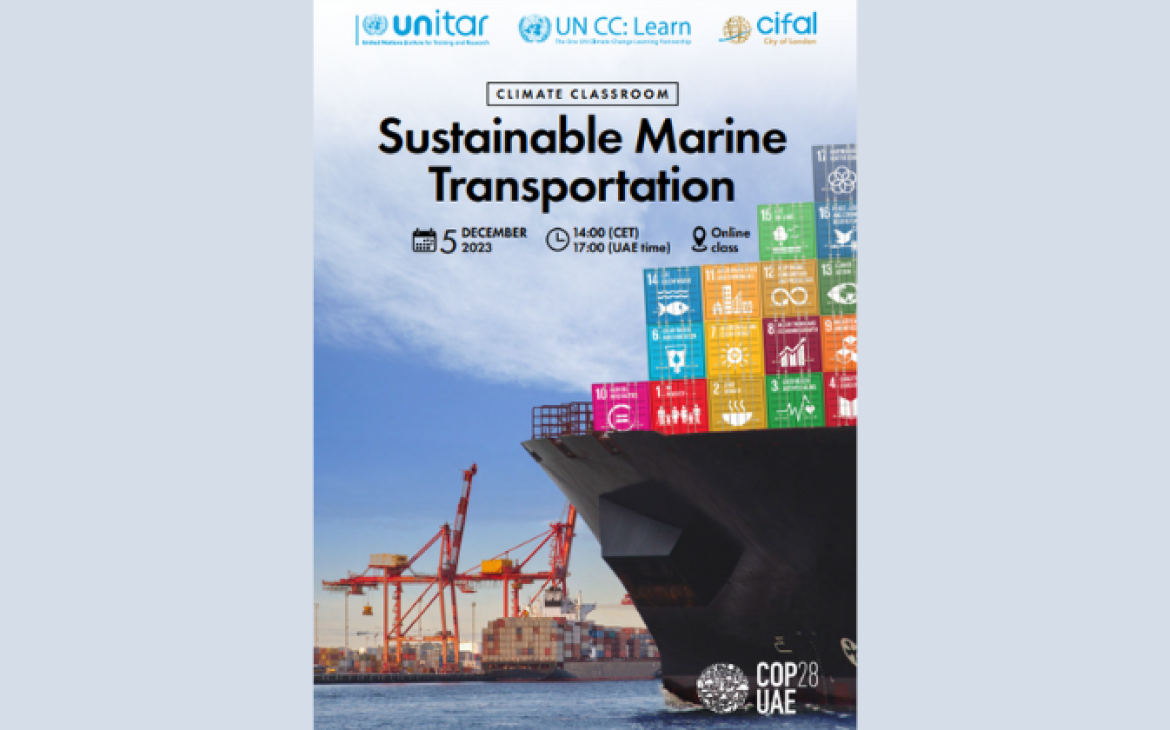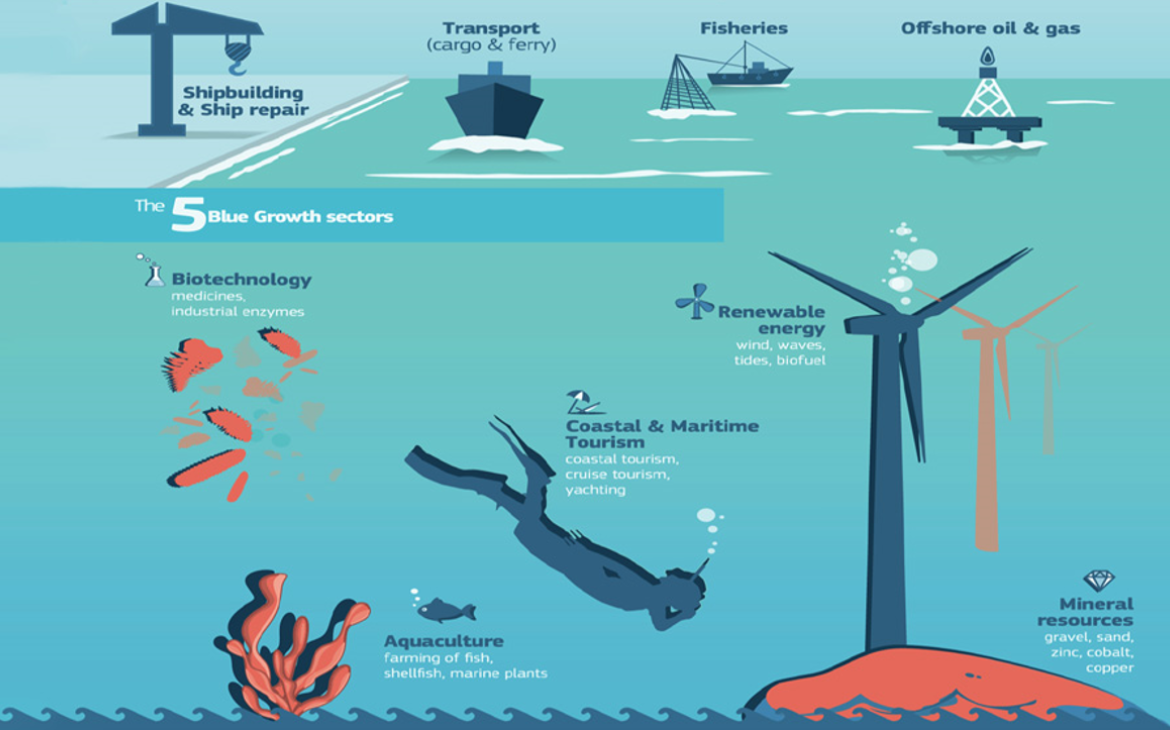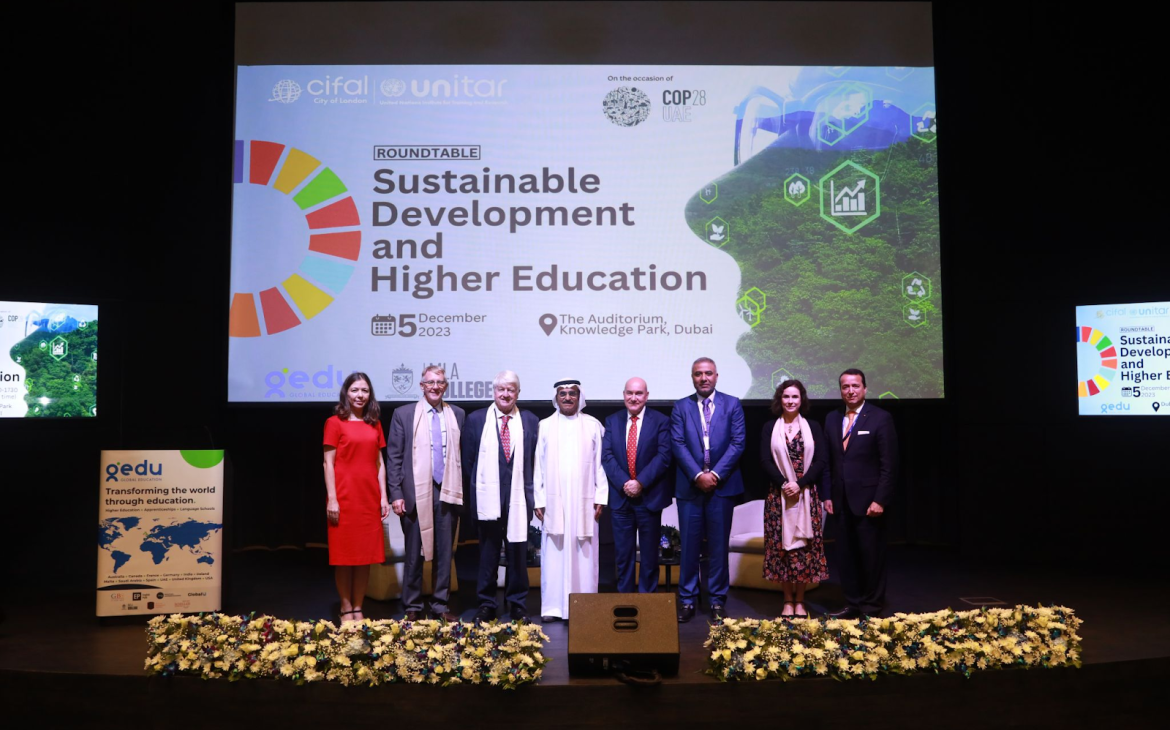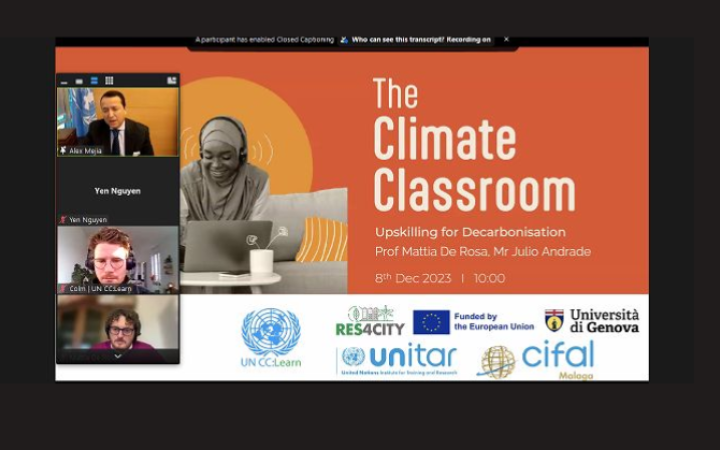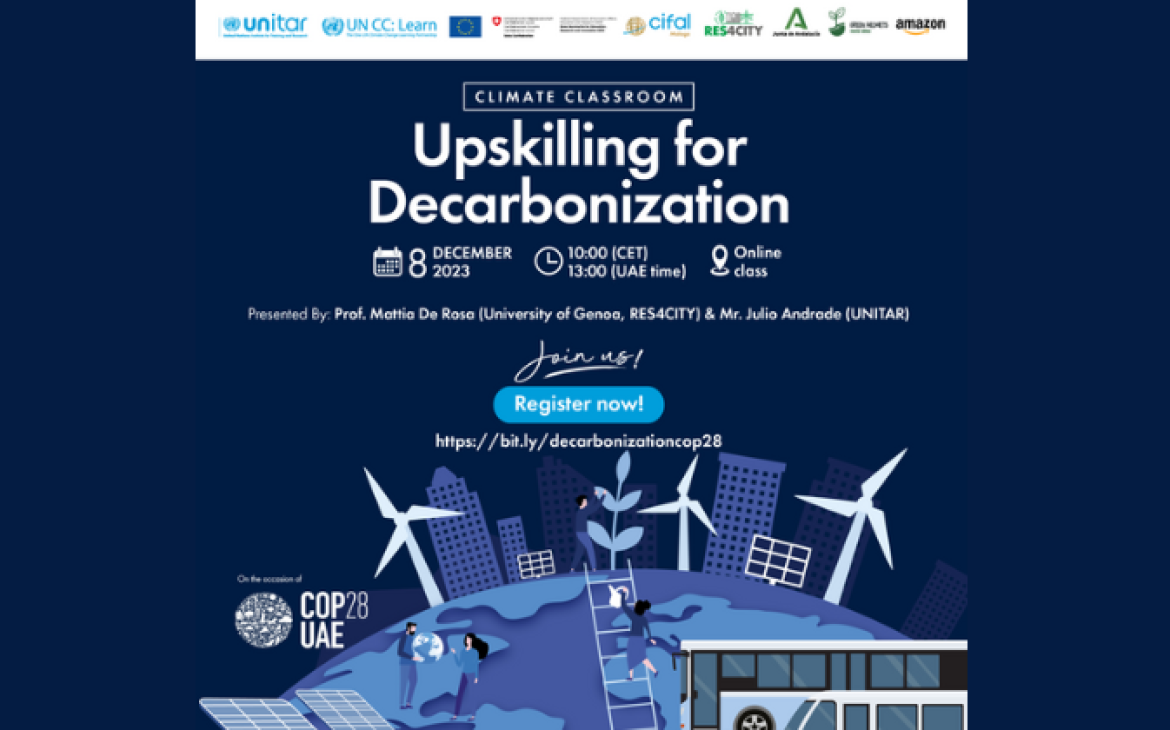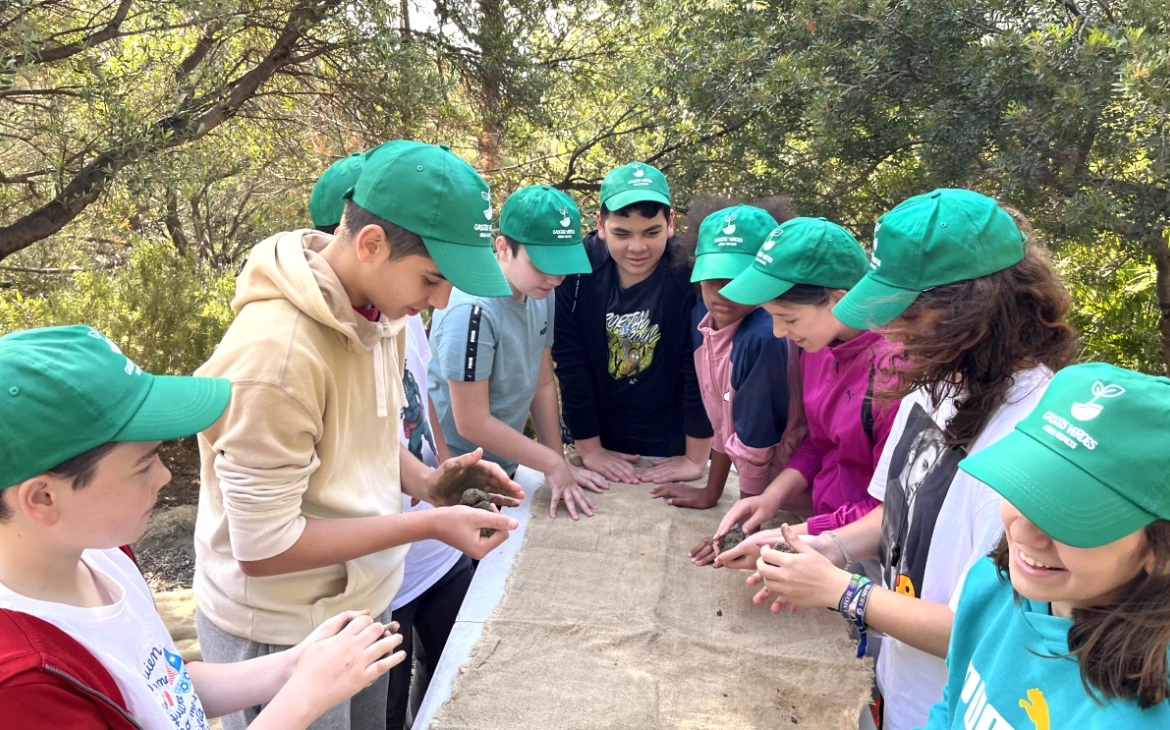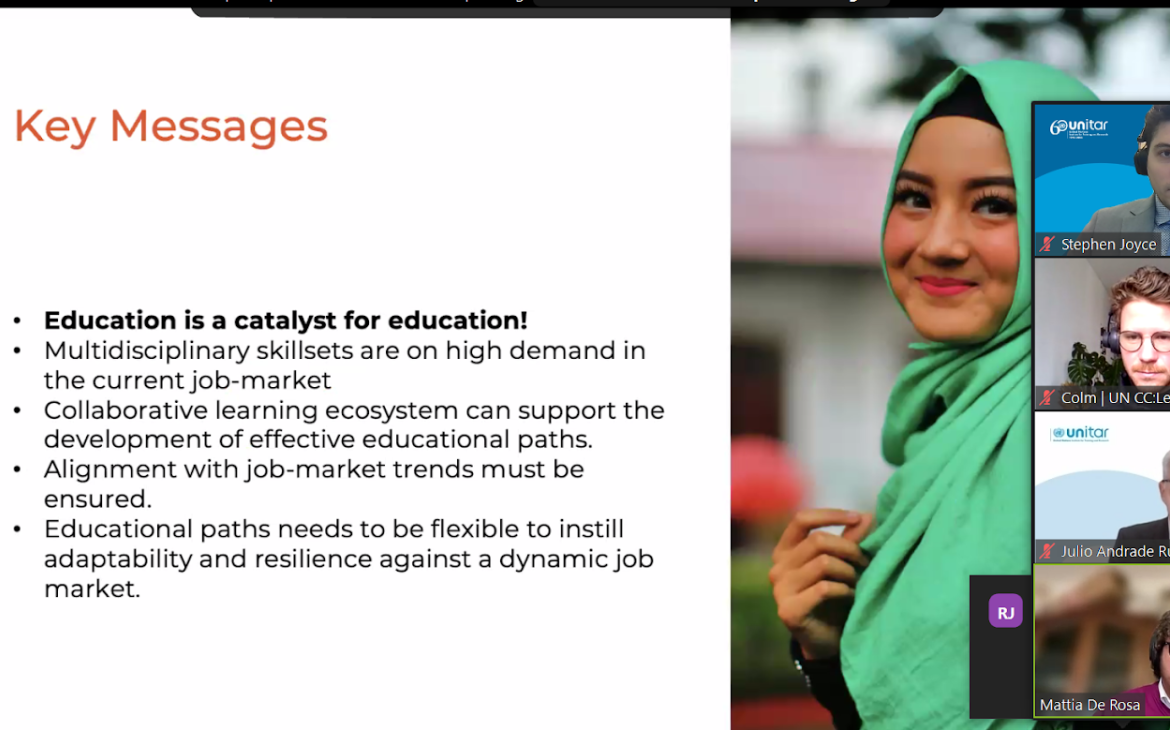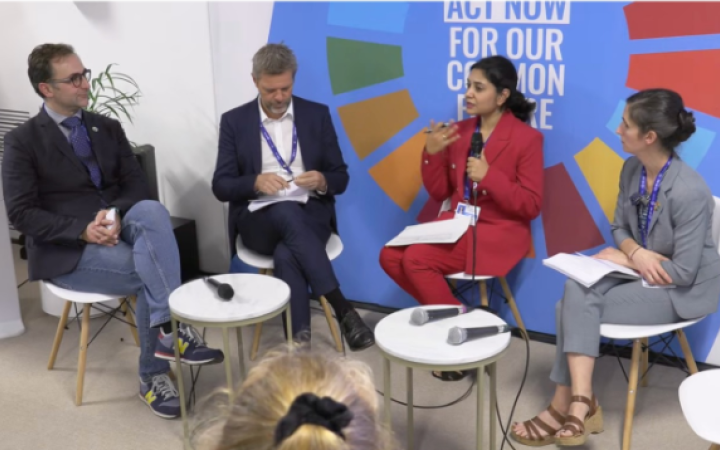21 December 2023, Online/Dubai, UAE - From the 4th to the 10th December, UNITAR hosted three events at COP28 for UN CC Learn’s Climate Classrooms, entitled; Tackling Plastic Pollution; Sustainable Marine Transportation; Upskilling for Decarbonization, and two in-person events at COP28, first with CIFAL City of London on December 5th entitled ‘Sustainable Development and Higher Education’, and second with RES4City at the ‘United in Science 2023’ event on December 10th.
The first event "Tackling Plastic Pollution," on December 4th, 2023 provided an interactive session addressing the critical issue of plastic pollution, and exploring its far-reaching impacts on the environment, economy, and public health. This Climate Classroom examined strategies for mitigating the adverse environmental effects of plastic pollution and reducing greenhouse gas emissions. The lesson underscored the need for proper plastic management to prevent pollution of land, rivers, and oceans, particularly in developing countries.
The event was joined by UNITAR Director of People and Social Inclusion, Mr. Alex Mejia who offered opening remarks and stated:
The time to act is now. Globally, only 9% of plastic waste is recycled, with 15% being collected for recycling, but 40% of that is disposed of as residues. Another 19% is incinerated, 50% ends up in landfills and 22% evades waste management systems and goes into uncontrolled dumpsites, is burned in open pits, or ends up in terrestrial or aquatic environments, especially in poorer countries.
These comments were further echoed by the Plastic Recycling Manager of Total Energies, Mr. Leo Nwofa, and the Project Coordinator of UNITAR’s Nigeria Project Office Ms. Ihouma Njemanze who acted as the Climate Classroom teachers for the event.
In the second part of the Climate Classroom, the focus shifts to CIFAL Nigeria’s Port Harcourt plastic management facility. UNITAR’s Nigeria Project Office has played a crucial role in program sustainability management, offering financial and technical expertise to the region. The classroom discussed the facility's initiatives including mentorship programs and collaborative awareness clean-up campaigns, which showcase the impact of community engagement in environmental cleanup. The Nigeria Project Office additionally provides the Train-Up with a Child (TUC) initiative, which targets students aged 6 to 25, aiming to instigate behavioural change, skills acquisition, and the promotion of waste management. This program aligns with UN SDGs and nationally determined contributions (NDCs), fostering a generation of environmentally conscious and skilled individuals. The facility's commitment to inclusion is noteworthy, with women comprising about 60% of direct employees and trainees, contributing to poverty alleviation.
The lesson objectives include understanding the significance of addressing plastic pollution comprehensively, exploring strategies to increase global recycling rates, recognizing the unique challenges faced by developing countries in plastic waste management, identifying the importance of private sector partnership, and enlightening strategies to create a self-sustaining plastic waste management system in developing countries while ensuring gender inclusion. The participants are encouraged to participate in meaningful discussions and contribute to the dialogue on the pressing issue of plastic pollution.
UNITAR's second Climate Classroom Event on Sustainable Marine Transportation
UNITAR's second Climate Classroom Event on "Sustainable Marine Transportation" on December 5th, 2023 examined the critical role of international shipping in global trade and the economy and explored challenges such as the industry's commitment to decarbonization by 2050. UN Assistant Secretary-General, and UNITAR’s Executive Director Mr. Nikhil Seth provided opening remarks stating.
The classroom teachers Dr. Malek Pourzajani from MLA Collage, and Prof. Başak Akdemir, Director of CIFAL City of London emphasized the need for a robust regulatory framework for safe and sustainable maritime transport globally. Additionally, the classroom addressed skill shortages in the sector and showcased advanced learning solutions for maritime professionals, emphasizing maritime and sustainability subjects.
The second part of the Climate Classrooms spotlighted CIFAL City of London's and MLA College's Maritime and Sustainability programs. The session examined the impact of MLA College's alumni on waste and pollution mitigation in the maritime industry, and shared strategies for generating a sustainable impact. For instance, the success of the 'Sustainable Maritime Futures – Women in Maritime: Leadership, Sustainability, and Belonging' training event was examined to shed light on the challenges faced by women in the maritime sector and consider improvements to impact the future.
Sustainable Development and Higher Education
In further collaboration with CIFAL City of London, GEDU Global Education and MLA Collage, on December 5th, 2023, UNITAR hosted the ‘Sustainable Development and Higher Education’ event at COP28.
The event commenced with impactful opening statements from Dr. Vishwajeet Rana, the CEO of GEDU Global Education, and Mr. Nikhil Seth, the Assistant Secretary-General of the United Nations, and Executive Director of UNITAR.
Following these remarks was a panel discussion featuring prominent figures committed to advancing SDG 4: Quality Education. Stanley Johnson, Chairman of GEDU Global Education and former Member of the European Parliament, shared insightful perspectives on the crucial role of sustainable development in higher education.
Professor Ray Lloyd, Chief Executive of the Global Banking School, contributed by providing remarks on education and finance expertise to the discussion, encouraging attendees to explore the intersection of sustainable development and economic growth. Dr Peter Ricketts, a distinguished Professor of Earth and Environmental Science, emphasised the urgent need for collective action to address climate challenges, underscoring the role of higher education. In closing, Professor Basak Akdemir, CEO of MLA College and Director of CIFAL City of London, reiterated the transformative power of education in driving sustainable change.
By focusing on sustainable development and higher education, the COP28 event fostered unity and collaboration in discussing how to make a global impact for students of environmental stewardship everywhere.
UNITAR’s third event on Transitioning to a Low-Carbon Economy
UNITAR’s third event at the Climate Classrooms on "Transitioning to a Low-Carbon Economy" on December 8th, 2023 offered a comprehensive overview of renewable energy technologies, decarbonization strategies, and social innovation for cities and communities.
UNITAR Director of People and Social Inclusion, Mr. Alex Mejia offered opening remarks and stated:
We [UNITAR] are fully committed to decarbonization, but still know there is much to do. These events are very important, as we need all of you to do your part. Youth remain at the core of the green transition for decarbonization.
This climate classroom led by Prof. Mattia De Rosa from RES4CITY, and Mr. Julio Andrade, former Director of CIFAL Malaga, and UNITAR’s CIFAL Global Network coordinator emphasized the essential role of transitioning to a low-carbon economy in mitigating climate change. Since 70% of the world's population will be urban dwellers by 2050, it is imperative to find solutions for urban challenges like air pollution and traffic congestion. The session underscored the urgent need for education and training in the renewable energy sector, anticipating the creation of 10.3 million net new jobs globally by 2030.
The second part of the Climate Classroom highlights real applications and examples, featuring the RES4CITY consortium, and CIFAL Malaga’s Green Helmets Program. Coordinated by university hubs strategically located in urban areas, the RES4CITY Network focuses on energy transition through multi-stakeholder partnerships. The network aims to address contemporary issues related to renewable energy systems and increase education and upskilling offers. Courses cover diverse topics such as decarbonization of thermal energy, circular economy enactment, sustainable development, and tools for cities' decarbonization.
The Green Helmets initiative is a mission-driven project dedicated to combating desertification, environmental care, and climate change mitigation, with a focus on the Autonomous Community of Andalusia, Spain, during its inaugural year. Green Helmets serves as an educational platform aiming to empower both young individuals and adults to propose and execute their own nature conservation projects. CIFAL Malaga-UNITAR has established a virtual classroom designed to educate young students, educators, and individuals interested in environmental sustainability.
Throughout UNITAR's participation in COP28 the Climate Classrooms have been impactful, addressing critical issues and fostering comprehensive discussions on pressing environmental challenges. The events covered a range of topics, including "Tackling Plastic Pollution," "Sustainable Marine Transportation," and "Transitioning to a Low-Carbon Economy."
From successfully bringing together experts, and leaders of environmental stewardship, UNITAR's Climate Classrooms at COP28 engaged over 1000 participants to address environmental challenges and their relationship with the SDGs. The events not only raised awareness but also provided actionable insights and examples, reinforcing the importance of collective efforts in achieving sustainable and resilient futures.
On December 10th, UNITAR represented by their partnership with Res4City Director Professor Fabiano Pallonetto addressed COP28, focusing on the transformative role of education in steering the public towards renewable energy adoption.
The COP28 discussion centred on the imperative of knowledge-sharing and collective efforts to construct a more sustainable world. This session was an integral part of the 'United in Science 2023' event, underscoring the significance of weather, climate, water, and environmental science in achieving the SDGs by 2030. The event actively promoted collaborations across science, policy, and society to accelerate progress towards the 2030 Agenda for Sustainable Development.
Professor Pallonetto, alongside his team, is dedicated to empowering citizens by providing them with the tools and knowledge to actively participate in a cleaner energy system. Through their EU-funded RES4CITY project with UNITAR, they are developing a co-designed educational framework aimed at rapidly enhancing the expertise of both academics and professionals in renewable energies and fuel technologies. This involves integrating, influencing, and amalgamating existing best practices, incorporating the use of an AI self-assessment tool and gamification.
Simultaneously, as part of the Science Foundation Ireland-funded RENEW project, the team collaborates with civil society, government, industry, and academic stakeholders to foster the development of sustainable energy communities in Ireland.
Professor Pallonetto emphasized, "Education is one of the keys to achieving the shared goals of the Paris Agreement and the 2030 Agenda for Sustainable Development – and projects like RES4CITY and RENEW help everyday people become experts in the renewable energy transition. This is how we can build a better future together."


